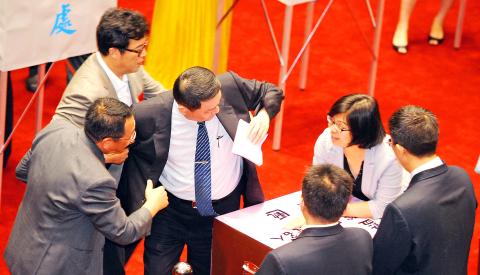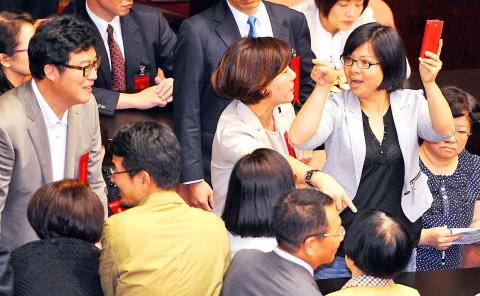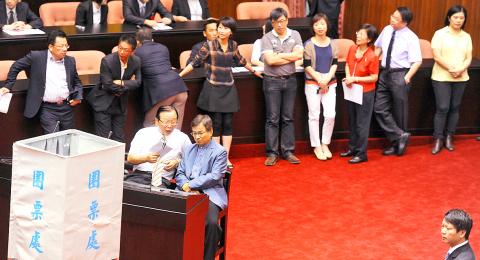An opposition blockade yesterday kept the legislature from voting on the nominations for Control Yuan members on the final day of the extraordinary legislative session after the Chinese Nationalist Party (KMT) reportedly decided to monitor its legislators’ votes to ensure they toed the party line, bringing an early end to the day’s meeting.
The Legislative Yuan had been scheduled to vote in the morning on the two nominees for president and vice president of the government watchdog and vote in the afternoon on the other nominees.
After Legislative Speaker Wang Jin-pyng (王金平) announced the start of voting, Democratic Progressive Party (DPP) lawmakers asked their KMT colleagues not to show their marked ballots to the party’s ballot overseer or other KMT lawmakers and also asked for cross-party negotiation.

Photo: Liu Hsin-de, Taipei Times
When the KMT did not respond to their requests, the DPP legislators created a roadblock by lining up to receive the ballot papers, but refusing to actually accept them and cast a vote.
From 9am to 11am — when the morning vote was scheduled to end — KMT, DPP and Taiwan Solidarity Union (TSU) legislators exchanged heated barbs in a confrontation that came close to a physical altercation.
DPP Legislator Yu Mei-nu (尤美女) said the KMT had intended to divide its lawmakers into groups of four and each group was to vote simultaneously at the four ballot boxes so they could “monitor each other’s votes.”

Photo: Liu Hsin-de, Taipei Times
While the DPP and the TSU had been the ones to initiate the blockade, not all KMT legislators were happy with their caucus’ call to push through the nominations.
“I personally think that as the roster of Control Yuan nominees this time has been widely criticized, the party should leave it to lawmakers themselves to exercise their own judgement… If the party insists on a ‘yes’ vote, the party’s prospects in the year-end elections will be greatly impacted,” KMT Legislator Chen Ken-te (陳根德) said.
KMT Legislator Lu Hsueh-chang (呂學樟) called the restriction “an insult to the lawmakers’ integrity” and the showing of marked ballots “a violation of the law.”

Photo: Liu Hsin-de, Taipei Times
The KMT and DPP held press conferences after the morning’s imbroglio. At its press conference, the KMT caucus fumed over what it said was yet another obstruction of legislative procedure by the DPP, claiming that the DPP’s interference violated Article 142 of the Criminal Code, which stipulates that “a person who … interferes with another in the free exercise of his right to vote … shall be sentenced to imprisonment for not more than five years.”
The caucus said the KMT would take legal action against DPP lawmakers.
KMT caucus deputy secretary Alex Fai (費鴻泰) said his party would call for a second extra session to vote on the Control Yuan nominations. He said the second session would be scheduled to start on July 28.
“If the second extra session does not work, there will definitely be a third or a fourth one,” Fei said.
However, the DPP said the KMT has been trying to use party discipline to “ram through the worst nominations” in Control Yuan history and refused to promise to allow a clean, supervision-free vote
DPP lawmakers cited the Criminal Code as well at their press conference.
The KMT was guilty of “procuring an incorrect result from voting or altering election returns by fraud or other illegal means,” a violation of Article 146 of the Criminal Code, and of Article 148, which prohibits a person prying into the content of a secret ballot, Yu said.
DPP Legislator Hsiao Bi-khim (蕭美琴), the caucus secretary-general, said that during cross-party negotiations last week the KMT had agreed not to oversee its lawmakers’ votes or have them show their marked ballots.
The DPP’s “technical hindrance” was simply a response to the KMT’s breach of that tacit agreement, she said.
DPP caucus director-general Tsai Chi-chang (蔡其昌) questioned the KMT’s right to accuse the opposition of violating the law and the Constitution over the nominations, reminding the KMT that it had former president Chen Shui-bian’s (陳水扁) Control Yuan nominations for as long as three years.
“We are undaunted by the KMT’s threat of a lawsuit,” Tsai said.
The KMT and its chairman, President Ma Ying-jeou (馬英九), should leave the legislature to deliberate the nominations rationally, Tsai said.

Taiwan Semiconductor Manufacturing Co (TSMC, 台積電) is expected to start construction of its 1.4-nanometer chip manufacturing facilities at the Central Taiwan Science Park (CTSP, 中部科學園區) as early as October, the Chinese-language Liberty Times (the Taipei Times’ sister newspaper) reported yesterday, citing the park administration. TSMC acquired land for the second phase of the park’s expansion in Taichung in June. Large cement, construction and facility engineering companies in central Taiwan have reportedly been receiving bids for TSMC-related projects, the report said. Supply-chain firms estimated that the business opportunities for engineering, equipment and materials supply, and back-end packaging and testing could reach as high as

CHAMPIONS: President Lai congratulated the players’ outstanding performance, cheering them for marking a new milestone in the nation’s baseball history Taiwan on Sunday won their first Little League Baseball World Series (LLBWS) title in 29 years, as Taipei’s Dong Yuan Elementary School defeated a team from Las Vegas 7-0 in the championship game in South Williamsport, Pennsylvania. It was Taiwan’s first championship in the annual tournament since 1996, ending a nearly three-decade drought. “It has been a very long time ... and we finally made it,” Taiwan manager Lai Min-nan (賴敏男) said after the game. Lai said he last managed a Dong Yuan team in at the South Williamsport in 2015, when they were eliminated after four games. “There is

POWER PLANT POLL: The TPP said the number of ‘yes’ votes showed that the energy policy should be corrected, and the KMT said the result was a win for the people’s voice The government does not rule out advanced nuclear energy generation if it meets the government’s three prerequisites, President William Lai (賴清德) said last night after the number of votes in favor of restarting a nuclear power plant outnumbered the “no” votes in a referendum yesterday. The referendum failed to pass, despite getting more “yes” votes, as the Referendum Act (公民投票法) states that the vote would only pass if the votes in favor account for more than one-fourth of the total number of eligible voters and outnumber the opposing votes. Yesterday’s referendum question was: “Do you agree that the Ma-anshan Nuclear Power Plant

Democratic nations should refrain from attending China’s upcoming large-scale military parade, which Beijing could use to sow discord among democracies, Mainland Affairs Council Deputy Minister Shen You-chung (沈有忠) said. China is scheduled to stage the parade on Wednesday next week to mark the 80th anniversary of Japan’s surrender in World War II. The event is expected to mobilize tens of thousands of participants and prominently showcase China’s military hardware. Speaking at a symposium in Taichung on Thursday, Shen said that Chinese Minister of Foreign Affairs Wang Yi (王毅) recently met with Indian Prime Minister Narendra Modi during a visit to New Delhi.